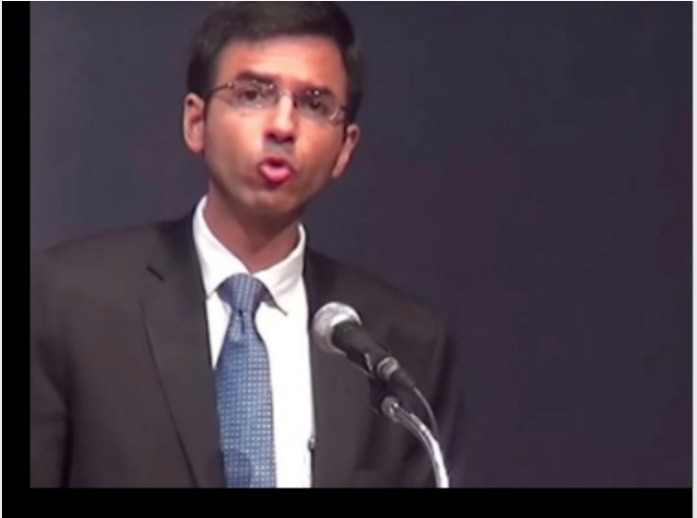New Delhi, March 14: An old video of Abhinav Chandrachud, son of Chief Justice of India DY Chandrachud, has gone viral wherein he explains why CAA is unconstitutional. Advocate Abhinav Chandrachud argues that CAA leaving out several minorities, atheists and agnostics is against the fundamentals of a secular nation.
Rajya Sabha MP and Shiv Sena (UBT) leader Priyanka Chaturvedi, sharing this video on X, said, “Do listen to Abhinav Chandrachud on not just CAA but also the constitutional gaps over the years on citizenship.”
“When the country was partitioned in 1947, two waves of migration took place from West Pakistan to India. In the first wave, which occurred after March 1947… there was a wave of migrations from West Pakistan to India; that was a migration of Hindus and Sikhs. But there was a second wave of migration which took place from West Pakistan to India and that occurred in 1948 where interestingly large numbers of Indian Muslims who had left India to go to Pakistan realized that Pakistan was not what they had thought it might be and therefore returned to India.”
“The return of Muslims in India created problems for the Indian administration. The law created considered these two categories to be different, the law referred to Hindus and Sikhs as displaced persons but the law referred to Muslims who left as evacuates. Muslims who left India to go to Pakistan, their property was referred to as evacuee property and their property was being used to rehabilitate Hindus and Sikhs who came from West Pakistan to India. So, the question arose if Muslims want to come back to India, what will happen to their evacuate property?” he added.
“Sardar Patel wrote to Nehru and said that look, the return of the Indian Muslims to India is creating trouble. We are in a charged communal environment and there’s been an influx of a large number of refugees in India and if we give the perception that we are going to now remove Hindus and Sikhs from the ‘evacuee’ property and give it back to Muslims, this is really going to be something that’s going to feed the communal poison of organisations like the RSS. This is really to paraphrase what Sardar Vallabhai Patel said and it was in this context that the Indian government introduced on 19 July 1948 a system that was essentially designed to keep Muslims from coming back to India that was called the “Permit System,” said Abhinav Chandrachud.
“Under this system if a Muslim wanted to come back to India, remember the system did not mention Hindu or Muslim; all it said was that if you were somebody who left India and wanted to return to India in other words Muslim then the provincial government where your property was located had the power to veto your return to India. In other words, a permit for permanent resettlement as it was called could be refused to you if your property was being used to rehabilitate displaced persons, in other words, Hindus and Sikhs. And this system essentially was entrenched in the Indian Constitution in Articles 5, 6 and 7 did not mention Hindu, Sikh, Muslim. It did not say anything about religion. So, on its face, it appears to be extremely secular,” he said.
“But when you investigate a little bit further and you read the debates of the Constituent Assembly, you realise that actually there were two hidden premises in the Indian Constitution for those who came prior to the permit system introduced on 19 July 1948, who presumed largely to be Hindus and Sikhs, citizenship was automatic. In the words of Dr BR Ambedker, all that was required is that you had to arrive in India and live in India since that’s very easy but for those who came after 19 July 1948, especially those who had left India and now sought to return, you required a permit for permanent resettlement,” he said.
On the Constituent Assembly debates on citizenship based on religion, he said, “In the Constituent Assembly there was a great debate on should we give citizenship on the basis of religion. There was a man called Mr Deshmukh who was an Oxford-educated barrister and a man by the name of Pandit Thakur Das Bhargav, who was responsible for the Directive Principle of State Policy that calls upon the state to prevent the slaughter of cows and cattle also responsible for the introduction of the word reasonable into the Indian Constitution when it comes to our liberties. These people essentially said that we should have citizenship on the basis of religion.”
“What undermines the secular credentials and the secular origins of the Indian Constitution, there are dark parts of the Indian Constitution. However, I do believe that a compelling argument can be made that the Citizenship Amendment Act as it stands today is unconstitutional because of Article 14 of the Indian Constitution which grants to everyone equality and the equal protection of the laws within the territories of India. And there are four or five reasons why one could argue that the Citizenship Amendment Act is unconstitutional because it violates the equality provisions of the Indian Constitution,” argued Abhinav.




